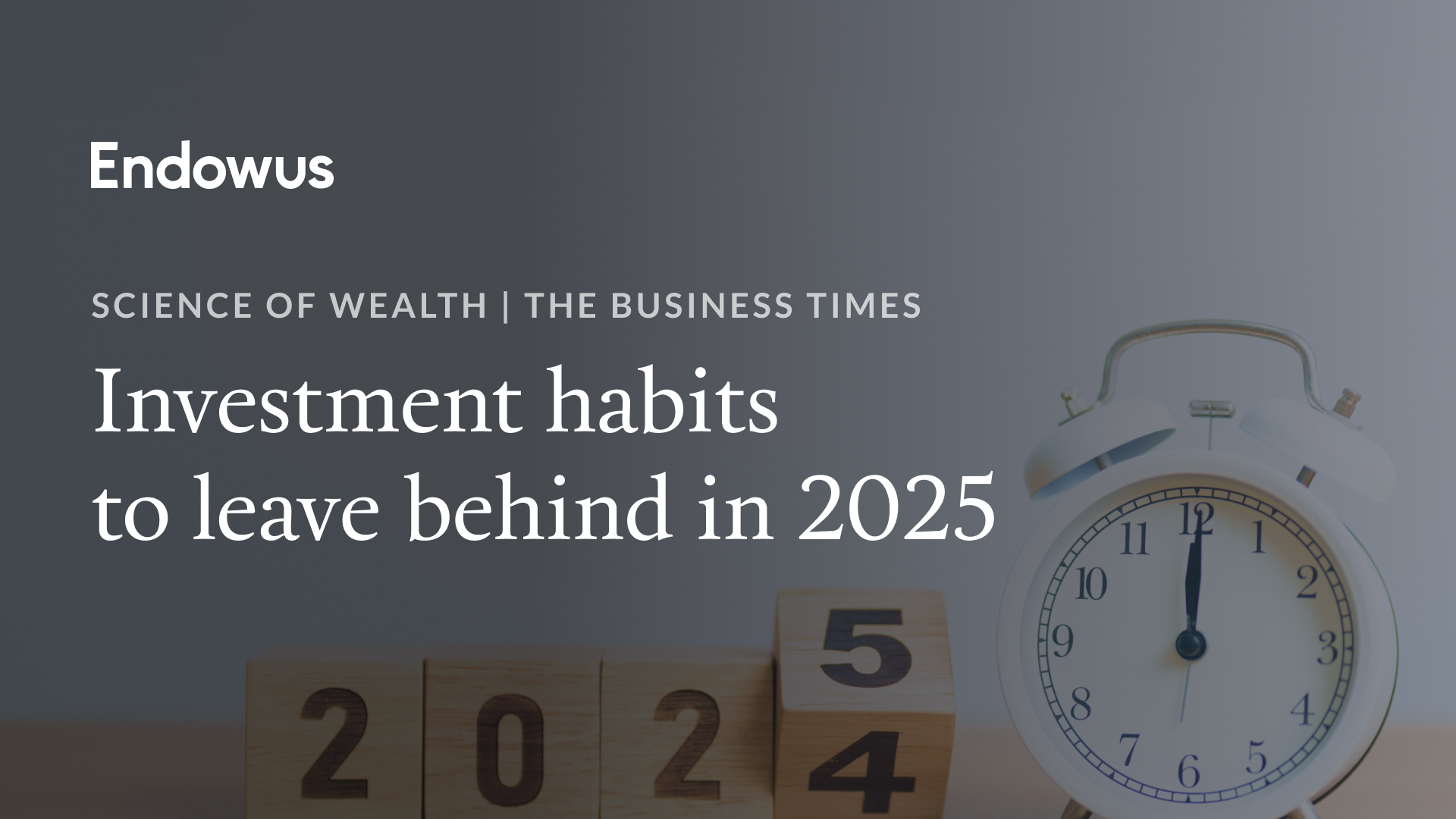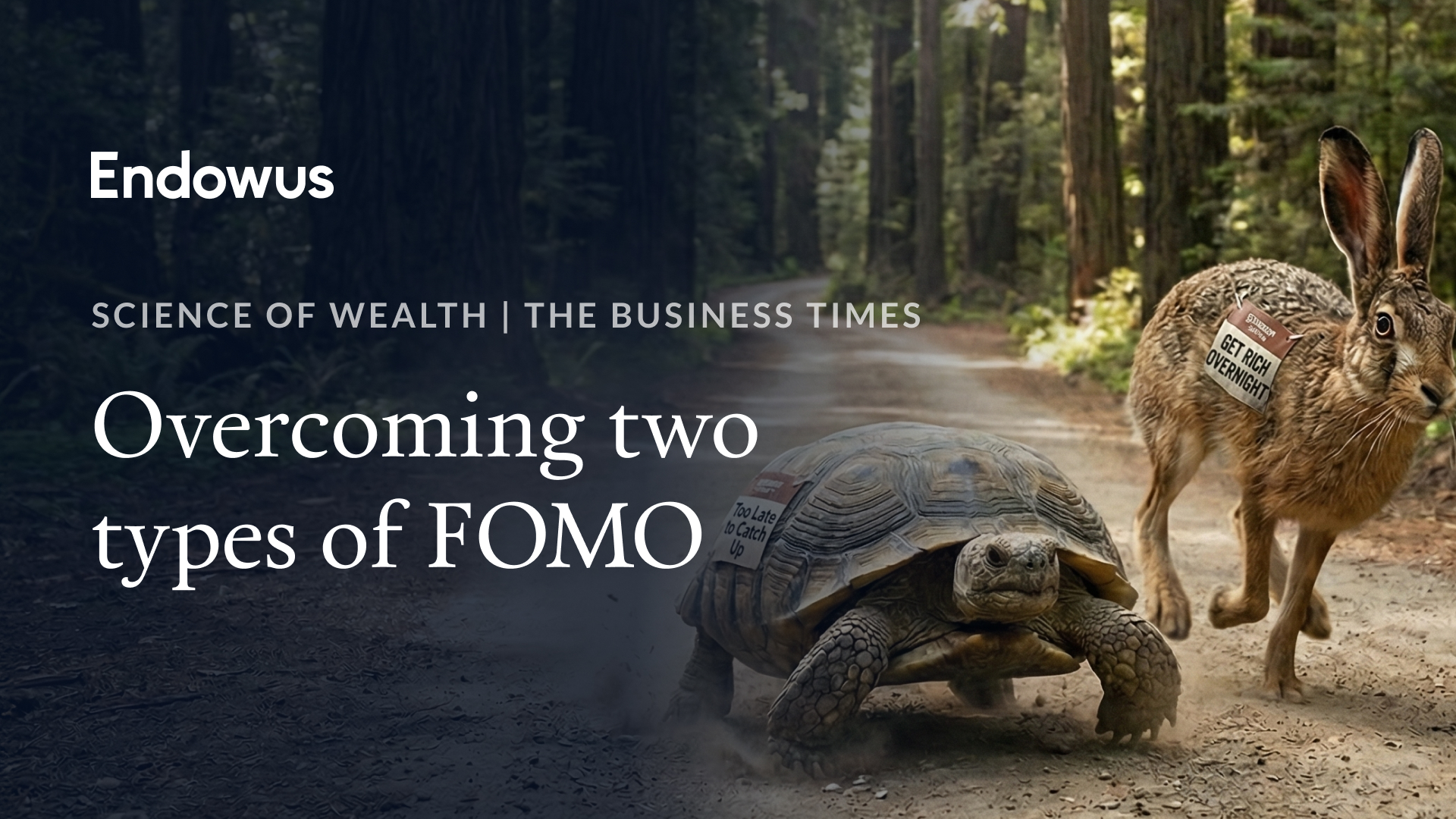Register for the event
Endowus invites you to our exclusive event with Macquarie Asset Management, as we discuss unlocking opportunities in Infrastructure- a $1.3tn asset class.
This event is reserved for Accredited Investors (AIs) only. To register for the event, please indicate one of the following:
The original version of this article first appeared in The Business Times.
Money and investing hold deeply personal meanings that differ among individuals because of their unique experiences. Our daily interactions with clients bring great joy and knowledge as we listen to these varying perspectives. Regret comes up pretty often, and the common phrases we hear include “I shouldn’t have”, or “I should have”.
Whatever those feelings may be, one cannot rewind the clock. It doesn’t matter whether you did not fully invest in that one stock that trebled in a year or were too late in exiting that stock which tanked. We can only look ahead, learn and understand the science of investing, as well as position ourselves for the future.
Coming off a strong year with global stocks up over 18%, it can be hard to remember how difficult times felt. Hard times will return – it is futile to try and guess when, or what the catalyst might be.
So to kick off 2026, I reflect on lessons in preparing one’s investment portfolio to be resilient when these hard times occur. These lessons are collated from our numerous conversations with our clients, from the most sophisticated family offices to first-time investors.
1. Waiting for an investment to get back to even can cost you more than your losses
The first stock I lost money on was a well-known blue chip company, everyone around me considered it a ‘cannot lose money’ stock. It lost 70% of its value over the next 15 years. Though the amount was small, the pain I felt was disproportionately large. I kept telling myself to just hold on until it bounced back.
After 20 years, that stock is still around half of my cost price. If I had switched to a diversified, low-cost and well-managed portfolio, I would have reduced my concentration risk and grown my investment by more than 400% in the same period.
The one thing I am certain of is that I will never get back those years.
Clients often share similar stories – of a stock, fund or insurance policy they are “stuck in”. Unfortunately, the stock and the market do not consider your cost price.
Even in the event that the losing stock recovers, investors must realise that the rest of the market will likely move up as well, so there is an opportunity cost. The emotional attachment to the cost price may cost them time and efficiency.
As investors, we should be objective and decide if what we own today makes sense for the future – not because it is a baggage of the past – just as the market determines today’s prices based on collective perceptions of what lies ahead.
It is painful to realise the loss, but what is more important is that your money is working in the most efficient way possible to compensate for the risk you take.
2. Be wary of a ‘sure thing’
While it can be tempting to follow a friend into a stock or trend that has run up a lot, investors must stay humble and understand that the price they pay today has already baked in a lot of exuberance for these “sure things”. It will likely be very expensive, with much more downside than upside left.
Three timeless Warren Buffett quotes help me calm down and stay rational:
- “Be fearful when others are greedy, and be greedy when others are fearful;”
- “Price is what you pay and value is what you get;” and
- “It’s far better to buy a wonderful company at a fair price than a fair company at a wonderful price.”
To this, I would add that we must also avoid buying a wonderful company at an insane price, which is what we see a lot of these days.
3. Fees can silently impact your wealth journey
1% extra in fees may not seem like much over one year or even five, but it adds up tremendously over time. The difference between achieving an annualised return of 7% and 8% over 30 years is that your money will grow 7.6 times and 10.1 times, respectively. That is a 250% difference going straight to your bottom line.
What is arguably even more important is that the advice and service you receive are aligned with your financial goals. Many platforms and advisers earn fees when you trade, which may encourage excessive churning or commission from product providers. This longstanding practice may incentivise the sale of high-commission, expensive products.
Paying a conflict-free fee is incredibly important to ensure you get the people and systems you interact with on your side, and they are motivated to grow your wealth as a top priority in their success.

4. Timing the market does not work in the long run
It is very tempting to try to time the market. The reward can be undeniable. Every day, we are given hundreds of reasons to go in and out of stocks, regions, sectors and more.
A recent study by Bloomberg collected Wall Street’s predictions for the S&P 500 since the year 2000. In the last five years, the range of predictions from over a dozen banks, brokers and economists did not capture the actual results.
The opportunity cost of not being invested is probably the most common “should have” story we hear about from clients.
5. Develop an investment strategy that suits your life
Many clients come to us frustrated at having accumulated all sorts of stocks, bonds, funds and products over the years. Some may not fully understand those asset classes, let alone the roles they play in their portfolios. This is an unfortunate symptom of incentives in the industry.
It’s important that investors realise why they invest – the purpose of building that wealth, what it is going to be used for, and when they need that money – which influences and determines what they should invest in.
Are you investing for a goal in the near term or long term? Or do you require regular income payouts? What is the appropriate time horizon, liquidity and volatility? From there, you can systematically formulate multiple diversified portfolios that are invested to stand the test of time and suit your life goals.
Time is our greatest ally in investing. Procrastinating compounds regret. Perhaps in these weeks leading up to Chinese New Year, dedicate some time to spring cleaning. Sweep up some investing mistakes to position your hard-earned capital for the future. That will be time well spent.











.webp)




%20(1).gif)






%20F1(2).webp)

.webp)






.webp)